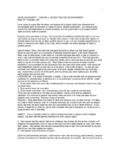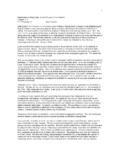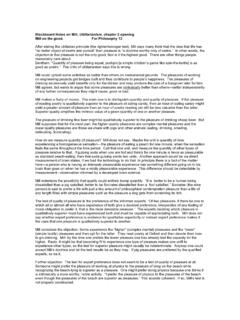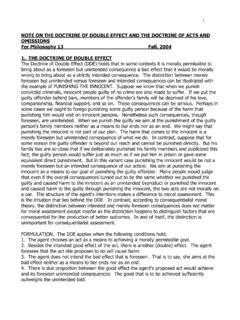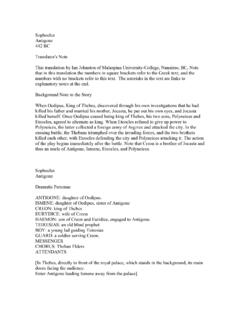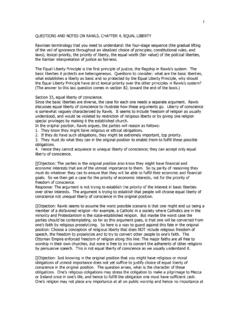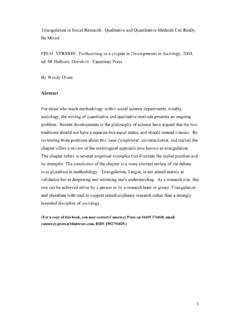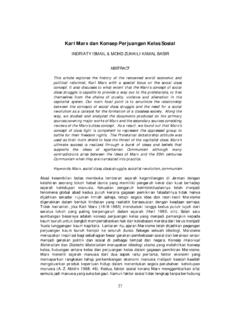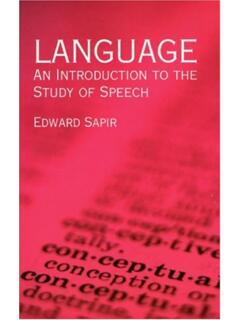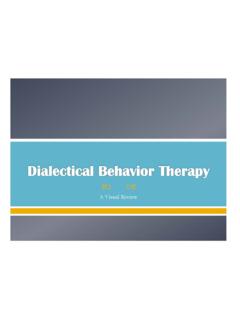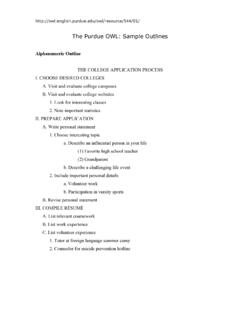Transcription of Hegel: Glossary
1 hegel : Glossary (from Sebastian Gardner)It is extremely useful to have access to a guide to hegel 's philosophical terminology. M. Inwood's A HegelDictionary is excellent for this purpose and remains invaluable at all stages in the study of hegel . There is a helpfulglossary in R. Solomon, In the Spirit of hegel , pp. 273-87. See also H. Kainz's discussion of the translation ofHegel's terms in the Introduction to his selection from the Phenomenology, and the 'Notes to the Glossary ' in hegel 'sThe Encyclopaedia Logic, ed. T. Geraets et al, pp. 347-52. The Glossary below is drawn from these sources. It is tobe noted that in Miller's translation of the Phenomenology the same German term is often translated in a variety ofunrelated adj., n. (absolut, das Absolute). Complete, self-contained, all-encompassing. Per Inwood, the Absolute'is not something underlying the phenomenal world, but the conceptual system embedded in it'.ABSTRACT (abstrakt). One-sided, empty, devoid of content. Opposed to: concrete.
2 For hegel , a particular, as wellas a universal, may be 'abstract', meaning (per Inwood) cut off from thought or other sensory , ACTUALITY (wirklich, Wirklichkeit). Fully-developed, matured. Actuality thus incorporates areference to (teleological) necessity; for hegel the contingent and irrational are not actual (they are, rather,appearance). In the case of spirit or truth, actual means 'for-itself', (Schein; Erscheinung). hegel has two terms translatable as appearance: Schein and Erscheinung.(Per Inwood:) Both are transient and dependent, and contrast with essence, but their relation to essence is different Schein is the mere 'shining forth' of an essence, whereas Erscheinung is its full disclosure in which nothing ishidden. Erscheinung nevertheless remains contingent rather than rational and necessary, and it contrasts withactuality and the Concept. hegel 's concept of appearance is thus different from Kant's: what Kant calls appearance(Erscheinung) is by hegel 's lights mere (konkret).
3 The whole, the thing itself in its entirety. Opposed to: abstract. A universal, as well as aparticular, may be concrete, meaning (per Inwood) 'grown together' with other universals or sensory (Begriff). Also translated (by Miller) as 'Notion'. The verb begreifen incorporates greifen, to seize. ForHegel, a concept is not (as it is for Kant) a representation of what several things have in common. Per Inwood,concepts are for hegel not sharply distinct from the 'I' or from objects, nor from one another. When hegel speaks ofthe Concept, he sometimes just means concepts in general, but he also uses it to mean, per Solomon, the mostadequate conception of the world as a whole. Per Geraets et al, the Concept refers to the movement of logicalthinking in its self-comprehension. Solomon suggests that for hegel the Concept sometimes has the force of 'ourconception of concepts', and that it may also refer to the process of conceptual change, since for hegel the identityof concepts is bound up with dialectical movement.
4 Inwood suggests that hegel sometimes assimilates the Conceptto God. Kainz glosses the Concept as a 'grasping-together of opposites'.CONSCIOUSNESS (Bewu tsein). Note that hegel sometimes uses consciousness as a generic term for cognitiveawareness, of which self-consciousness is one species; and sometimes as a species of consciousness in the genericsense, where it contrasts with , DETERMINATION, DETERMINATE, DETERMINACY/DETERMINATENESS (bestimmen,Bestimmung, bestimmt, Bestimmtheit). To determine something is to conceptualise, articulate, identify,particularise, specify it. Solomon suggests that the term plays a similar role in hegel to 'constitute' in and determinacy presuppose negation (Inwood:) a thing is determinate only in so far as itcontrasts with other things or concepts which are determined in a way in which it is not. The determinacy of a thingconsists in its features, in the broadest possible (Dialektik). The form of movement of concepts, in which development takes place through opposed orcontradictory stages.
5 The development in question pertains to the subject-matter of the Phenomenology, to formsof consciousness, and it is internal to them: it is self-development through self-criticism. Per Inwood, dialecticinvolves three steps: (1) one or more concepts are taken as fixed, sharply defined and distinct from one another =stage of understanding; (2) through reflection on them, a contradiction or contradictions emerge = stage ofdialectical reason; (3) the result is a higher concept which embraces the earlier ones and resolves their contradiction= stage of speculative reason. hegel thus inverts Kant's sense of dialectic as a logic of illusion. Geraets et aldistinguish a broad use of dialectic , to refer to the entire movement of the self-articulation of thought, from anarrower use, which refers to the self-negations of the , ESSENCE (wesentlich, Wesen). The essence of a thing is what it really is, the thing in itself, itsconceptual core. Essence contrasts with 'being' in a wide sense, and with appearance.
6 In so far as essence isindeterminate, it is 'other than' appearance; in so far as it becomes determinate, the relation of essence to appearanceis reciprocal, they are correlates. In application to consciousness, essence means (per Pinkard) its kind of (Erfahrung). In the Phenomenology, experience refers to the experience of consciousness on its wayto Science. It does not have the usual implication of restriction to the sensory but rather hinges on thought; so it doesnot mean for hegel what it means for the empiricists or for Kant. hegel originally planned to give thePhenomenology the title 'Science of the Experience of Consciousness'.FOR ITSELF (f r sich). Reflective, explicit, self-comprehending, fully developed (Miller often translates f r sich as'explicit'). Contrasts with: in itself, (Idee). The unity of object and Concept; reality as sublated. The Idea is associated with the infinite, andequivalent to the , IMMEDIACY (unmittelbar, Unmittelbarkeit). More usually in hegel , a characteristic of thingsrather than an epistemological term, meaning: intuitive, naive, undeveloped, not worked through; simple, given,elementary, initial, unrelated to other things.
7 Opposed to: mediate, ITSELF (an sich). Merely potential or implicit (Miller often translates an sich as 'implicit'). Something is 'initself' when it is considered separately from other things, and (in the case of a form of consciousness) when it isunreflective. That is why, for hegel , the in itself is mere potentiality: actuality requires determination, negation,relations with other things. Note that a thing may be 'in itself for us' (an sich f r uns), an expression hegel usesoften: this just means that we are considering it as it is separate from other things. Contrasts with: for itself, and AND FOR ITSELF (an und f r sich). Completely developed; both at home with itself, and finding itself in theother. It contrasts with mere being in itself and being for itself. Being in-and-for-itself is the condition of theAbsolute, God, Spirit , INDIVIDUALITY (einzeln, Einzelnheit). Also translated (by Kainz) as 'singular, singularity'.Distinct from particularity: individuality is the third stage (moment) of the Concept in hegel 's triad of universal particular adj.
8 , n. (unendlich, Unendlichkeit). Unconditioned, without restriction, not standing in need ofexplanation, absolute. Things relate to the infinite in so far as they are self-contained, autonomous, and fulfil theirconcept; they are finite in so far as they fall short of their concept. Infinite does not therefore refer to the endlessnessof a ( mathematical) series. hegel in fact distinguishes the true (good) infinite from the false (bad) infinite: thetrue infinite, associated with reason, is the unconditioned, self-contained etc.; the false infinite, associated with theunderstanding, is the merely endless. The Concept is genuinely infinite; space and time exemplify the false says in the Encyclopaedia Logic 93-5: what is genuinely infinite is 'something which in its transition intoits other coalesces only with itself'.INTUITION (Anschauung). A term of Kant's, referring to the immediate, non-conceptual presentation of a 's attitude to the concept of intuition is mostly , MEDIATION (vermittelt, Vermittlung).
9 Mediation is working over, conceptualisation, reflectionupon; the union of two terms by a third, especially the union of the universal and the particular in the to: immediate, (Moment). An essential but partial aspect, a stage, a part of a whole. A moment is therefore notnecessarily temporal. The three moments of the Concept are universality, particularity, and , NEGATION, NEGATIVITY, NEGATE (negativ, Negation, Negativit t, negieren). hegel use ofnegation, like his use of truth, is usually remote from its familiar sense in application to judgements or propositions:things and concepts are for hegel negations of one another (negativities). The negative is that which is differentfrom, opposed to, other than. Negation is for hegel determinate, as determinate as what is negated, and the phrase'determinate negation' figures often. hegel 's thought characteristically observes the dialectical sequence: (1)affirmation, (2) negation, (3) negation of negation = affirmation of something new.
10 In application to consciousness,per Pinkard, negativity refers to the capacity of consciousness to critically undermine its own form of rationality;(determinate) negation is the skeptical undermining of a form of (Begriff). See , PARTICULARITY (besonder, Besonderheit). Distinct from individual: particularity is the secondstage (moment) of the Concept in hegel 's triad of universal particular , POSITIVITY (positiv, Positivit t). Solomon: opposed to natural or rational. Inwood: merely (Vernunft). Solomon suggests: purposive activity, conceptual and reflective thought, the use of conceptsin self-understanding; the ultimate purpose of reason is to comprehend total unity, break down false or limiteddistinctions, and resolve conflicts. It is opposed to understanding. In so far as reason reveals contradictions in theproducts of the understanding, it is dialectical; in so far as it resolves these contradictions in higher unities, it isspeculative. For hegel therefore, in contrast with Kant, reason is cognitively superior to understanding even in thetheoretical (Reflexion).
